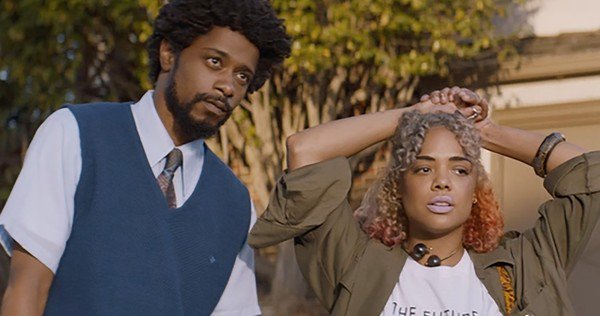
In a way, there couldn’t be a more inappropriate name for Boots Riley’s dark comedy than Sorry to Bother You. The film is the opposite of apologetic: It’s bold, brash, and riotously subversive.
The title refers to the opening line that our hero, Cassius Green (Lakeith Stanfield), must recite to potential customers from the cramped telemarketing office where he works. He’s desperate to do well—he lives in a garage in the Oakland home of his uncle (Terry Crews) and wants to move out and marry his free-spirited artist girlfriend (Tessa Thompson)—but he’s a bust. Then a wily old co-worker (Danny Glover) at the desk next to his suggests he follow his lead and use his “white voice” to project an air of carefree confidence. (In one of the film’s many uncanny and surrealist flourishes, the white voices are actually performed by white actors. In Stanfield’s case, it’s David Cross. In Glover’s, it’s Patton Oswalt. The effect is hilariously destabilizing.)
Cassius’ new white voice does the trick—his sales go through the roof and he’s promoted to become one of the company’s mysterious “power callers.” He’s taken up a gilded elevator and into a trendy and open space—the exact opposite of the call center below. But while downstairs they are selling encyclopedias, upstairs they are selling much more nefarious goods, including slave labor. Cassius’ conscience is troubled—all the more so when he has to cross a picket line led by his buddy Squeeze (Steven Yeun) to get to that gilded elevator—but the money is too good. Soon he’s paying his uncle’s mortgage and buying a slick new apartment and car. But instead of being impressed, his girlfriend, Detroit, finds herself liking the new Cassius less and less.
At one point, Cassius is invited to a hip party being thrown by the coke-snorting Steve Lift (Armie Hammer), the creator of “WorryFree”—the slave labor camp that’s being touted in its advertising campaign as a utopian commune of sorts. Cassius is one of the only black people at the party and he’s asked to entertain the crowd by rapping. When he protests, Lift and the aggressively cheerful crowd insist. He begins to rap, falteringly, and gets blank stares until he starts spewing the “N-word” over and over again. The crowd roars its approval.
Sorry to Bother You has a lot to say about racism, the exploitation of the worker, and the commodification of pain, especially when it comes to black bodies (a popular reality TV show the film keeps flashing to is called I Got the Sh*t Kicked Out of Me; Detroit does a performance art piece where people pelt her with trash). And then it gets even weirder. I won’t spoil it here, but you can throw body horror into the film’s already combustive stew.
And yet, despite its serious and dark themes, Sorry to Bother You is a gas. The lanky, stoner-cool Stanfield makes for an engaging and easy-to-root-for hero, even when he’s making the wrong choices, which is often. And Tessa Thompson’s Detroit, who sports large homemade earrings with penises and irreverent phrases on them, and dyes her hair a rainbow’s worth of colors, already feels like a cinematic icon: A beautiful artist and activist who preferred her boyfriend when he was broke but still had integrity? Yes please.
Sorry to Bother You is the kind of movie that makes you want to do formulas to explain it to people: Michel Gondry + Terry Gilliam + Donald Glover + Jordan Peele = This Film. And yet, it has an energy, a punk spirit, and an originality all its own. I can see it becoming the kind of film that plays to raucous crowds at midnight showings on college campuses. But why wait for the film to become a cult classic? Go see it now.
